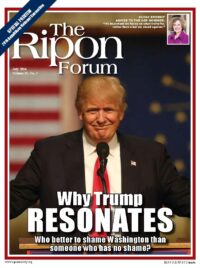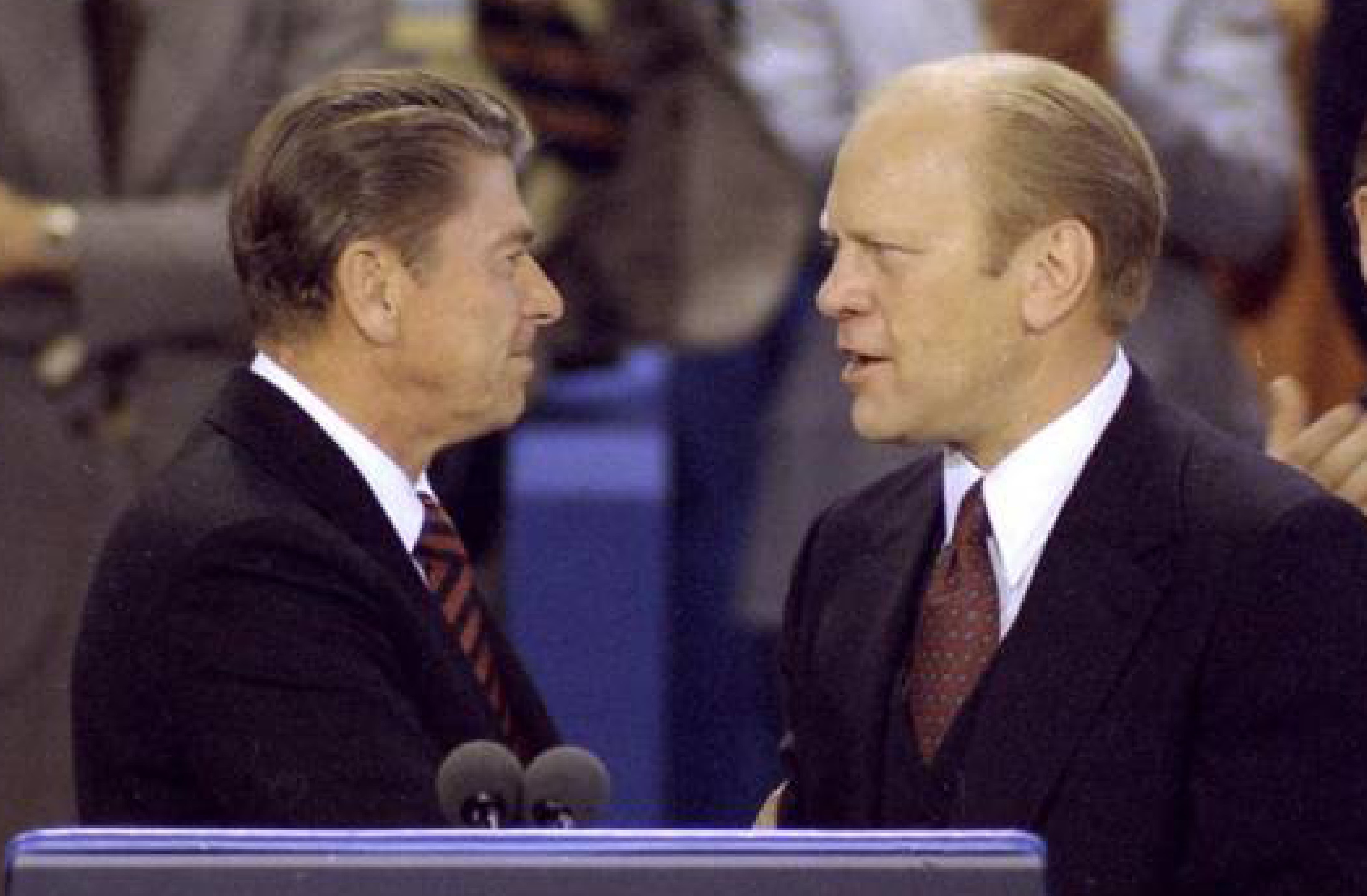
Forty years ago this summer, Republicans gathered in Kansas City for the Republican National Convention of 1976. It would be the last time the GOP entered a convention without a clear nominee. It would also be the last time the party allowed an air of uncertainty to hang over the proceedings.
In the years since, conventions would become set, staid affairs, where nothing was left for chance and the outcome was already known. Many began questioning whether conventions were even needed. The major networks were no longer covering all four nights, and what they did cover was limited to speeches and interviews in the 10-11 pm time slot.
The expected nomination of Donald Trump at the 2016 Republican National Convention in Cleveland will likely change that. If GOP conventions since 1980 have followed a script, this one may well turn into a reality show – which is befitting given Trump’s years as host of the Apprentice, but is concerning for those who remember the chaotic convention of ’76 and the result at the ballot box later that fall.
What follows is a brief summary of Republican Conventions over the past 40 years – the highs and lows and good and bad of each, and how all of it, and none of it, compares to what we may see in Cleveland this year.
1976: The Battle of Kansas City
Few conventions have been as contentious as the battle between President Gerald Ford and Ronald Reagan in America’s bicentennial year. One was an outsider — a former actor and governor who had electrified the conservative movement. The other was an establishment Republican and unelected incumbent who had risen through the ranks.
Both had campaigned in the shadow of Watergate. Neither possessed enough delegates to win the nomination outright. Reagan’s supporters argued that their candidate brought a lot of people into the party. “The fact that we’ve had competition is a plus”[1]. As the convention began, many warned that the proceedings will “be unlike any Republican National Convention you ever watched. It will be full of passions, conflict, gamesmanship, and suspense. It will be untidy. It will be fascinating.”[2]
Few conventions have been as contentious as the battle between President Gerald Ford and Ronald Reagan.
The media responded by providing unprecedented levels of television coverage. One Republican official lamented that “the prime-time factor dictates that the convention’s proceedings will start just after cocktail time on its penultimate and ultimate night.”[3] With Reagan’s supporters issuing rules challenges and so ardently opposing Ford’s nomination, many feared a potential split within the party, questioning if the contested convention was “a prophecy that this year, as so long threatened, the Republicans could go the way of the Whigs.”[4]
The warnings did not prove prophetic. Ford won the nomination and went on to lose the election to Jimmy Carter, but the party survived – as did Reagan, who, in part on the strength of an electrifying concession speech on the convention floor, emerged from Kansas City not only alive but politically stronger than ever.
1980: The Reagan Revolution
A mere four years after narrowly losing the nomination to Ford, Reagan returned to the GOP Convention as the presumptive nominee. Whereas chaos and rules challenges were the order of the day in Kansas City, order and party unity were the rule of the day in Detroit. In fact, things were so orderly that some were worried that people would lose interest.
“Reagan’s only problem in Detroit next week will be stage management, trying to stir some excitement in what promises to be one of the dullest GOP conventions in memory,” wrote Steve Neal of the Chicago Tribune. “The biggest question, of course, is the vice presidential nomination. To keep everyone guessing, Reagan probably won’t announce his choice until Thursday morning.”[5]
And that is exactly what he did. After seriously considering the idea of forming a unity ticket with his 1976 rival, former President Gerald Ford, Reagan settled on his rival from that year’s campaign – former CIA Director, George H.W. Bush. With the ticket set, Republicans left Detroit “with the hope that 1980 would be the breakthrough year for a born-again Republican Party, just as the 1932 election helped establish the Democrats as the pre-eminent party.”[6]
Over the next four years, Republican hopes would be realized. A new era was born.
1984: Morning in America
“It’s morning again in America. Today more men and women will go to work than ever before in our country’s history. With interest rates at about half the record highs of 1980, nearly 2,000 families today will buy new homes, more than at any time in the past four years. This afternoon 6,500 young men and women will be married, and with inflation at less than half of what it was just four years ago, they can look forward with confidence to the future. It’s morning again in America, and under the leadership of President Reagan, our country is prouder and stronger and better. Why would we ever want to return to where we were less than four short years ago?”
Those who were around at the time can still hear legendary ad man Hal Riney saying the above words in the commercial that came to define the 1984 Reagan reelection campaign. The tone of the commercial – upbeat, positive, optimistic – was reflected in that summer’s GOP Convention in Dallas, as well. The Keynote Address was delivered by Katherine Ortega, the U.S. Treasurer and the daughter of Mexican immigrants, who – addressing not Republicans, but Democrats — urged those in the opposing party to “join us now,” telling them, “Nuestra casa es su casa … Our home is your home.”[7]
After another masterful speech by Reagan to officially accept the nomination on Thursday night, Ray Charles performed an improvised rendition of “America the Beautiful” to close the convention and send Republicans off on their way to a 49-state landslide victory that fall.
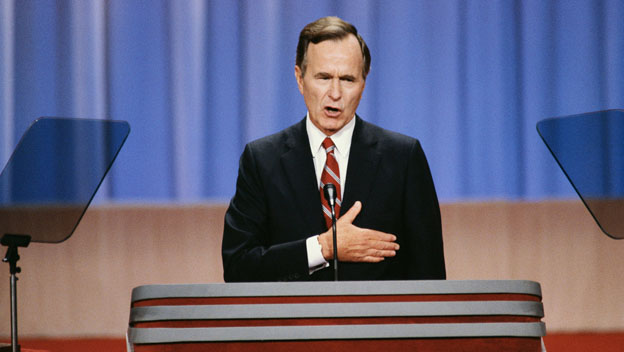
1988: Passing of the Torch
After defeating five other candidates in the Republican Party primary, George H.W. Bush traveled to the GOP Convention in New Orleans with one goal in mind – to officially accept the mantle from Ronald Reagan as the 1988 Republican presidential nominee. “The vice presidency is not really the big story here at all,” GOP strategist John Sears said at the time. “It’s how Bush does, it’s how he comes across, particularly Thursday night.
George H.W. Bush traveled to the GOP Convention in New Orleans with one goal in mind – to officially accept the mantle from Ronald Reagan as the 1988 Republican presidential nominee.
As it turned out, the number two pick did end up being a big story when Bush surprised everyone by selecting Indiana Senator Dan Quayle as his running mate. But the surprise gave way to wistfulness when Reagan gave an emotional farewell address on Wednesday evening, and by the time Bush outlined his vision for a “kinder, gentler nation” in his acceptance speech the following night,” Republicans had begun to turn the page and look toward victory in November, which they achieved.
1992: End of an Era
It could be argued that the face of the Republican Party began to officially change at the party’s 1992 convention in Houston. For even though Reagan came out of retirement to deliver one more hopeful speech on behalf of his successor, a darker mood descended upon the party’s gathering as well. The mood stemmed from an ailing economy, which had seen unemployment rise to nearly 8% over the previous two years, and by an uneven economic record during Bush’s first term, which had seen him going back on his “No New Taxes” pledge.
The mood was reflected outside the convention hall by the candidacy of Ross Perot, a billionaire businessman who had launched a third party bid for the White House earlier that year. Inside the hall, the dark mood was further reflected by the speech of Pat Buchanan, who mounted a populist challenge against Bush in the primary and spoke of a culture war in remarks that convention organizers would no doubt describe as being off script.
Bush still managed to leave the convention with a 6-point bump in the polls, but the surge didn’t last, and on November 3rd, he went down to defeat.
1996: The War Hero & the Quarterback
When Republicans traveled to San Diego for the GOP Convention in 1996, they not only knew who their nominee was going to be, but who his running mate was going to be, as well. Bob Dole and Jack Kemp brought years of experience to the Republican ticket. They were the Senator and the Secretary; the common sense conservative from the heartland and the bleeding heart conservative from New York; the war hero and the quarterback.
In addition to the acceptance speeches of the two running mates, one of the highlights of the convention was the speech by Elizabeth Dole, who captivated those in attendance with an Oprah-like performance that saw her leave the podium and, wireless mike in hand, stroll among the delegates on the convention floor telling them about the virtues of her husband, his lifetime of service to America, and why he was prepared to lead the party – and the nation – as President over the next four years.
Despite her bravura performance, network ratings were down overall. The reason was simple: in selecting Kemp the Friday before the convention began, Dole took away the last bit of suspense that came with conventions of recent years. And in doing so, he took away one of the last reasons for the networks to provide three hours of coverage of the conventions for all four nights. “I can’t imagine devoting as much time or as many resources to convention coverage in the year 2000,” said CBS News President Andrew Hayward after the event.[8]
2000: New Vision for a New Century
By the time the Republican National Convention kicked off in Philadelphia four years later, Americans were ready for a change. Since the last election, the country had seen a President impeached, a Speaker of the House step down, and a disturbing increase in terrorist attacks on U.S. interests overseas. The new century called for a new vision, and that’s just what George W. Bush offered when he took to the convention stage to formally accept the GOP’s nomination for President.
“This is a remarkable moment in the life of our nation,” the Texas Governor declared. “Never has the promise of prosperity been so vivid. But times of plenty, like times of crisis, are tests of American character … Big government is not the answer. But the alternative to bureaucracy is not indifference. It is to put conservative values and conservative ideas into the thick of the fight for justice and opportunity. This is what I mean by compassionate conservatism. And on this ground we will govern our nation.”
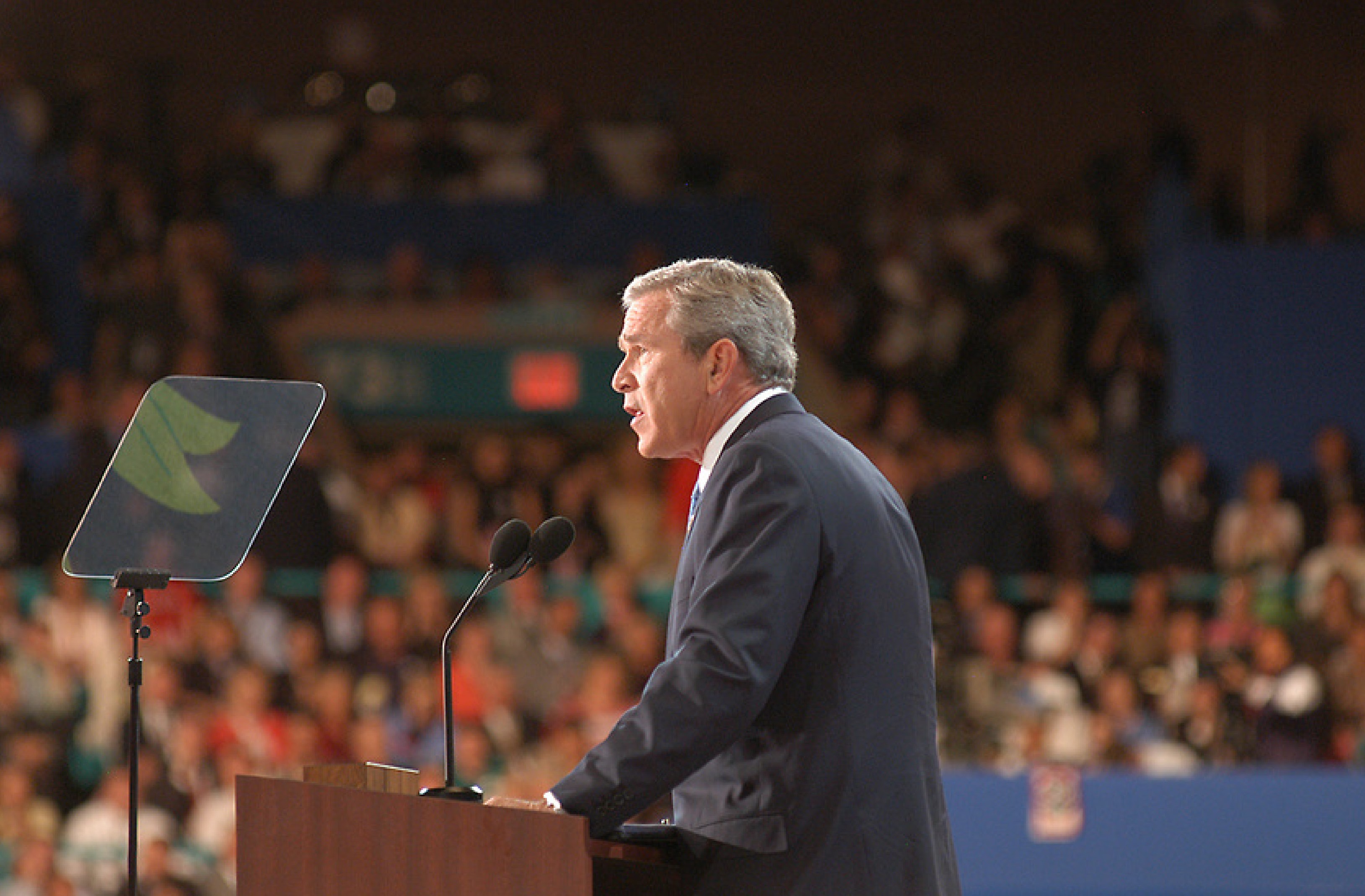
2004: In the Shadow of 9/11
Bush defeated Democrat Al Gore in 2000 in one of the closest and most contentious contests in election history. But if any hard feelings existed after his victory, they were quickly forgotten on September 11th of the following year. The 2001 terrorist attacks changed America and the world for good. They also reordered Bush’s priorities. He was now a War President. And while there can be no doubt that he remained a compassionate conservative at heart, the main focus of his administration became keeping our country secure.
The 2004 Republican National Convention in New York City reflected that. Held in Madison Square Garden just over three miles from Ground Zero, the convention was meant to remind people of the pain and suffering the country had gone through, and the considerable threats and challenges that still lie ahead. National security leaders such as Rudolph Giuliani and John McCain spoke, as did relatives and victims of the terrorist attacks.
Like the two conventions before it, there was little suspense at the GOP convention in New York. But there was a lot of emotion. And at the end of the day, it can be argued that emotion – particularly as it relates to the fear of terrorism — helped carry Bush through to victory later that year.
2008: The War Hero & the Hockey Mom
When John McCain astonished the political world by picking the then-relatively unknown Sarah Palin as his running mate on August 29, 2008, one of the biggest questions surrounding the following week’s GOP convention in Minneapolis became — “How will she do?” As it turned out, the self-proclaimed hockey mom and one-term Alaska Governor hit it out of the park, delivering what Chris Cillizza later called the best speech of her career. “She slayed,” Cillizza wrote.[9]
Her remarks, along with tributes to McCain’s long record of military service and the nominee’s formal acceptance speech the following night, helped propel the Republican ticket to a 5-point lead in the polls coming out of the convention. The lead didn’t last though. Two wars, a bad economy, and the promise of electing the nation’s first African American President proved too much for the War Hero and the Hockey Mom to overcome in the end.
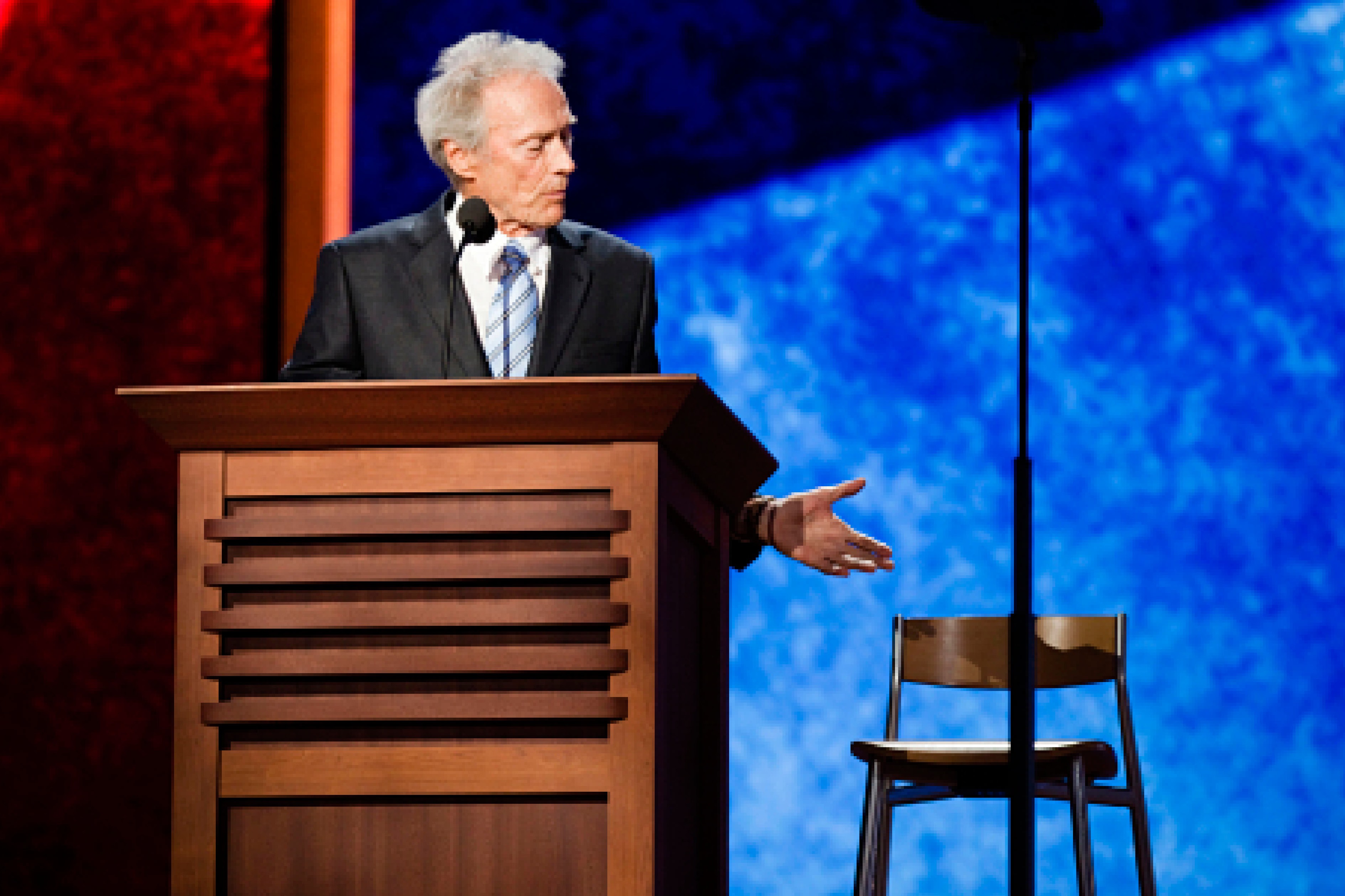
2012: Make My Day
If one were looking for a reason why organizers like to follow a tight script when planning a political convention, then look no further than the 2012 GOP convention in Tampa. From having to delay the opening of the proceedings by one day because of a hurricane to having to contend with Clint Eastwood’s decision to carry on a conversation with an empty chair on the convention’s final night, the importance of proper planning and execution should be apparent for all to see.
If one were looking for a reason why organizers like to follow a tight script when planning a political convention, then look no further than the 2012 GOP convention in Tampa.
One mistake can overshadow a good message. Just ask Mitt Romney and Paul Ryan. They received no bounce from the convention[10], and went on to lose a tough but very winnable race in the fall. Which brings us to…
2016: Trump & the Reality Show
…the Republican National Convention this year in Cleveland. Donald Trump certainly has beaten the odds. An outsider with no political experience, he stands on the cusp of being formally named the GOP nominee. Despite this, a growing number of delegates have launched an effort to stop him in Cleveland.
The effort conjures up memories of 1976 and raises the likelihood that this year’s convention will potentially stand in stark contrast to the relatively uneventful coronations of the recent past. It is unclear what will unfold in Cleveland; however, America’s love of reality television promises high ratings and possibly even a twist ending – an environment in which Donald Trump has always thrived.
This report was prepared with the research and assistance of Hannah Shepherd and Jesse Jacobs. Hannah is a rising junior at Miami University in Ohio, while Jesse is a rising junior at Georgetown. Both are serving as Michael G. Oxley Interns with The Ripon Society this summer.
___________________________________________________________________________
[1] Cannon, Lou an Broder, David “Battered Grand Old Party” Washington Post June 27, 1976: Print
[2] “A Guide for Convention Watching New York Times August 16, 1976: Print
[3] Lelyuld, Joseph “Networks Face an Opportunity – and a Risk” New York Times August 16, 1976: Print
[4] Cannon, Lou an Broder, David “Battered Grand Old Party” Washington Post June 27, 1976: Print
[5] Neal, Steve “This show will be all Reagan’s” Chicago Tribune July, 8, 1980: Print
[6] Smith, Hedrick “GOP Hopes Go Beyond 1980 And Beyond the White House, NY Times, July 20, 1980: Print
[7] Gerstel, Steve “Katherine Ortega sent two messages in delivering the Republican” UPI August 24, 1984
[8] Bennet, James “Few Tears for the Death of the Network Convention” NY Times September 1, 1996: Print
[9] Cillizza, Chris “Seven years ago today, Sarah Palin gave the best speech of her career” Washington Post, September 3, 2015
[10] Jones, Jeffrey M. “Romney Gets No Bounce From Last Week’s GOP Convention” Gallup, September 4, 2012



